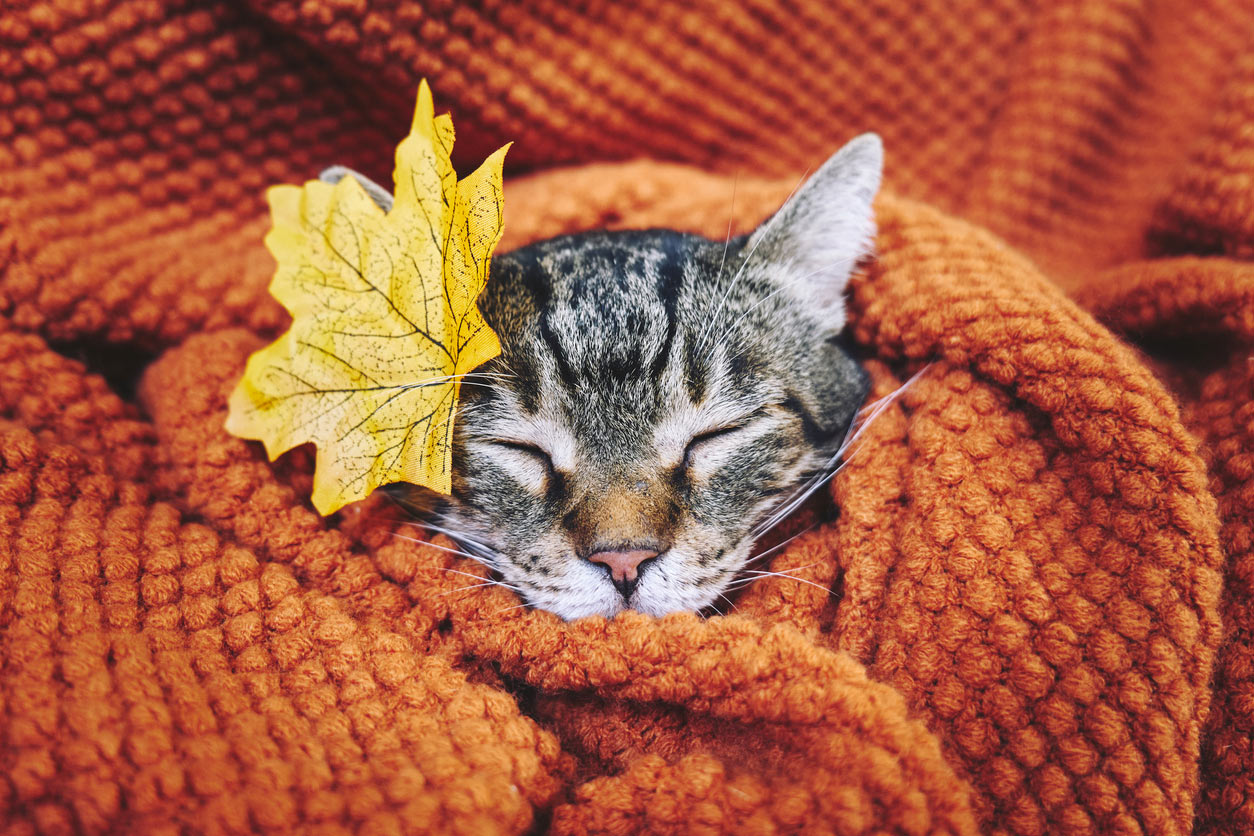Fall Allergies in Cats: How to Spot the Signs and Help Your Feline Friend

Can Cats Really Get Seasonal Allergies?
When the air turns crisp and leaves begin to fall, many of us find ourselves sniffling and sneezing. But did you know cats can suffer from seasonal allergies, too?
Just like people, cats can react to common fall allergens such as:
- Mold spores
- Ragweed pollen
- Dust from fallen leaves
These allergens can cause subtle but uncomfortable symptoms in cats, often mistaken for other issues.
Common Symptoms of Fall Allergies in Cats
Cats don't always show allergies the same way humans do. Instead of mostly watery eyes or sneezing, you might notice:
Skin & Coat
- Excessive licking or scratching (especially around the belly, paws, or flanks)
- Red, irritated, or inflamed skin
- Hair loss or thinning coat (from over-grooming)
- Scabs or sores (secondary to scratching or licking)
Ears
- Ear infections (redness, odor, discharge, or discomfort)
- Excess wax, debris, or discharge (may be brown, yellow, or black)
- Head shaking or head tilting (as if trying to “shake something out”)
- Frequent scratching at ears and/or rubbing the ears on furniture, carpet, or with their paws
- Irritability or pulling away when the ears are touched
-
Hematoma (swollen ear flap) if blood vessels burst from vigorous shaking/scratching
Advanced Ear Signs
- Loss of balance or disorientation (if the infection spreads deeper)
- Holding one ear lower than the other
- Vocalizing suddenly (cry, hiss, or meow) if you touch the affected ear
Important: Even if allergies are suspected, ear discomfort in cats should always be checked by a veterinarian. Allergies can predispose cats to secondary ear infections, which may need medication to resolve.
Common Respiratory Signs
- Sneezing — often intermittent, especially on high-pollen or dusty days
- Coughing — may sound dry and hacking
- Wheezing — whistling sound when breathing out, caused by narrowed airways
- Runny nose — usually clear discharge (not thick or colored like with infection)
- Watery eyes — mild tearing can accompany sneezing or nasal irritation
Less Common Respiratory Signs
- Increased snoring or noisy breathing (from nasal congestion)
- Open-mouth breathing (serious — can indicate more significant airway inflammation)
 Red Flags
Red Flags
If you notice these, see a vet immediately:
- Labored breathing (working hard to breathe, sides visibly moving)
- Blue or pale gums (oxygen deprivation)
- Open-mouth breathing at rest (emergency sign in cats)
Most cats with allergies will only show mild sneezing, coughing, or occasional wheezing, but because cats hide illness so well, even subtle changes in breathing should be taken seriously.
Digestive (Less Common, But Possible)
While seasonal allergies mainly affect the skin and respiratory system, some cats may also show digestive signs, especially if food allergies are present.
- Vomiting (occasional or chronic)
- Diarrhea or soft stools
- Increased hairballs (from swallowing allergens while grooming)
- Flatulence (gas)
- Decreased appetite or picky eating
- Weight loss if allergies are chronic or untreated
Digestive issues are more often linked to food allergies than seasonal allergies, but some cats experience both.
When It's Not Just Allergies
Here's the tricky part: these signs can look like fleas, food sensitivities, or skin infections. Because of this overlap, it's important not to guess. A veterinary exam can help rule out other causes and get your cat on the right treatment plan quickly.
How to Help Your Cat at Home
While you should always consult your vet, there are simple steps you can take to make your cat more comfortable during allergy season:
- Keep windows closed on high-pollen days
- Vacuum more frequently to cut down on dust buildup
- Use an air purifier to filter indoor air
- Groom your cat regularly to remove allergens from the coat
- Wipe down your cat's fur and paws with a damp cloth after outdoor exposure
Veterinary Treatment Options
If your cat needs more relief, your veterinarian may recommend:
- Antihistamines
- Soothing medicated shampoos
- Prescription allergy medications
- Treatments for secondary skin or ear infections
- Allergy testing and immunotherapy (allergy shots or drops) for persistent cases
 Important Safety Note:
Important Safety Note:
Never give your cat any medication — even over-the-counter products — without veterinary guidance. The wrong medication or dose can be dangerous, even fatal. Always rely on your veterinarian to choose the right product and dosage for your individual cat.
The Bottom Line
With a little extra care, most cats can get through allergy season comfortably. By recognizing the signs, reducing allergens in your home, and working closely with your veterinarian, you'll help your cat breathe easier this fall. With your support and your veterinarian's guidance, your cat can stay healthy and happy — no matter the season.
You May Also Like These Articles:
Polycystic Kidney Disease (PKD) in Cats
Common Plants Poisonous to Cats
How to Keep Your Cat from Chewing on Houseplants
First Aid for Cats: An Overview
Foods Toxic to Cats - Slideshow
Subcutaneous Fluid Therapy: Giving Your Cat Fluids at Home
Notice: Ask-a-Vet is an affiliated service for those who wish to speak with a veterinary professional about their pet's specific condition. Initially, a bot will ask questions to determine the general nature of your concern. Then, you will be transferred to a human. There is a charge for the service if you choose to connect to a veterinarian. Ask-a-Vet is not manned by the staff or owners of CatHealth.com, and the advice given should not delay or replace a visit to your veterinarian.






